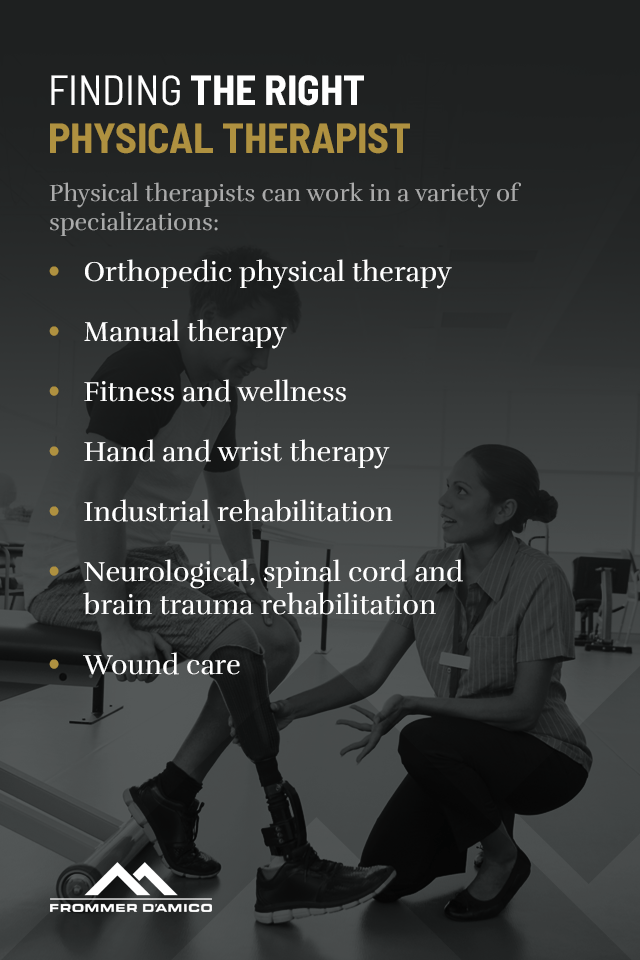Table of Contents
If you’ve been injured on the job, and you’ve been awarded workers’ compensation, it’s likely that one of the medical treatments that you will receive will be physical therapy. Doctors frequently prescribe a course of physical therapy for injured workers for a variety of injuries such as back pain, an injured leg or arm, or to help recover your muscle strength after surgery.
If physical therapy is going to help a worker recover from an injury, it is critical they work with the right physical therapist and make sure that their workers’ compensation claim covers the number of treatments they will need.
How Physical Therapy Can Help
A 2016 review by the Travelers Companies of more than 1.5 million workers’ compensation claims across the country between 2010 and 2014 found that the injuries most reported on workers’ compensation claims involve strains and sprains. These are precisely the injuries that physical therapy can help the most.
Physical therapy offers potential health rewards for injured workers and makes sense for the insurance company that is paying for the treatment. Recent studies have shown that including physical therapy in an injured worker’s course of treatment can produce significant positive benefits. Some of these benefits include improved outcomes for the injured worker, a reduction in the use of pain medication like opioids, patients were more satisfied with their treatments, fewer readmissions by the injured worker for continuing pain, and lower indemnity and medical costs.
Many doctors want to use imaging to diagnose back pain. But a study by the Health Services Research Journal showed that when patients are first treated with physical therapy, it costs roughly $4,700 less than if the patient is first given an MRI or an x-ray.
In 2012, The Spine Journal released a study that showed that when a primary care physician referred a patient such as an injured worker to physical therapy, there were fewer surgeries and injections, and patients did not use prescription medications as frequently. It also resulted in savings of about $2,700 a patient.
Currently, if physicians prescribe pain medication for an injured worker, about 65 to 85 percent of them will receive an opioid. An analysis shows that probably as many as 90 percent of these injured workers would be better treated if they received over-the-counter pain medications and physical therapy. In fact, the proper use of physical therapy, applied at the right time and in the right way, results in a significant reduction in the cost of pain medication overall.
Physical therapy can help injured workers recover from the following kind of injuries:
- Therapy for the hand that is caused by conditions like carpal tunnel syndrome or trigger finger
- Any injury involving the musculoskeletal system including back pain and rotator cuff tears
- Traumatic brain injuries
- Spinal cord injuries
- Tendinitis
- Fractures
- Stroke
Some of the benefits of physical therapy for injured workers include:
- Less need for medication such as opioids and better pain management
- No need for surgery
- Improved mobility
- Faster recovery from an injury suffered on the job
- Helping to prevent falls by restoring stability
- Restoring strength to injured workers’ muscles
Physical therapy can greatly aid in an injured worker’s recovery. It is important, however, to find the right kind of physical therapist since not all physical therapists treat the same problems. A therapist who specializes in orthopedic treatments is the one to seek out if you are recovering from something like a back injury. A neurological physical therapist would be the best one to see if you have suffered a traumatic brain injury or a spinal cord injury.
How to Make Sure It Gets Approved
While all the data would seem to indicate that physical therapy is a benefit for both injured worker and insurance companies, the reality is that insurance companies often seek to deny or limit physical therapy.
First, physical therapy needs to be ordered by a doctor. Someone in the doctor’s office will then schedule your first physical therapy appointment. Here is where the trouble can start. For many years, insurance companies regularly approved doctor-ordered physical therapy. Many insurance companies now believe that physical therapy is overused or that patients don’t need as many physical therapy sessions as the doctor has ordered.
Since physical therapists will probably not treat you until you get approval from the insurance company, these companies drag their feet in several ways:
- They deny all treatment. Often the way they do this is to have you visit another doctor known for being friendlier to the insurance company who will report that you do not need physical therapy.
- They don’t approve the therapy. This leaves you in a kind of physical therapy limbo. The insurance company has not denied the treatment, but they haven’t given the physical therapist the approval that they need to treat you.
- They give partial approval. This is what frequently happens with workers’ compensation physical therapy. Your doctor may order that you receive therapy four times a week for three weeks. The insurance company adjuster only approves three times a week for two weeks. In essence, this is just another form of denial, and you should treat it as such.
If this happens to you take the following steps:
- Contact the physical therapist’s office and make sure they have requested approval from the insurance company for the treatments.
- If the physical therapist has requested approval, you or your attorney should contact the claims adjuster and ask them to approve your physical therapy. Sometimes this will work, but if they continue to refuse your treatment, you must take more concrete steps.
- If you decide to continue with physical therapy and pay for it on your own until the situation is resolved, make sure that you keep all medical bills and receipts for payment you have made to the physical therapist.
- Speak immediately to an attorney if you have not already hired one who can help you file an appeal. You should file the appeal as soon as you receive a denial letter about your treatment or if you feel that the insurance company is taking too long to approve your treatment.
Does Workers Compensation Pay For Physical Therapy?
In Pennsylvania, any treatment considered reasonable and related to an injury suffered on the job is covered by workers’ compensation benefits. This includes physical therapy, so if the insurance company is denying you needed treatment, they may be doing so illegally.
Finding the Right Physical Therapist
As we mentioned above, some physical therapists specialize in different areas of physical therapy. If you suffered a spinal cord injury, you don’t necessarily want to work with a physical therapist who specializes in orthopedic injuries or one who helps injured workers recover from carpal tunnel syndrome.
Physical therapists can work in a variety of specializations:
- Orthopedic physical therapy
- Manual therapy
- Fitness and wellness
- Hand and wrist therapy
- Industrial rehabilitation
- Neurological, spinal cord and brain trauma rehabilitation
- Wound care
These are just a few areas. Therefore it is important when you speak with your doctor about beginning a course of physical therapy treatment that they identify the field of physical therapy that will help you the most. For instance, industrial rehabilitation can be a good specialization for injured workers. These therapists are trained to help those who have suffered work-related injuries. They can help your doctor evaluate your work tasks to see if any restrictions are needed for you to return to work and they can design workflows that will limit aggravating a work-related injury.
You want to find a therapist who has the following qualifications:
- They are licensed to practice in Pennsylvania.
- They are up-to-date on all important treatments for injured workers, and they can fully explain the benefits of physical therapy to you.
- They are experienced in treating your kind of work-related injury.
- They are great communicators. An important part of physical therapy is being able to explain to you how the therapy is helping you and how you may even be able to do some of the exercises at home. A good physical therapist will also be aware of your pain levels and apply the treatment appropriately.
- They work in a location that is convenient for you. This will make it easier for you to comply with any scheduled therapy.
- Although this is not a qualification as such, you want to find out if you will have a single therapist or multiple therapists. Many practices have a rotating system of therapists where you will be working with one therapist on a Monday and a different one on a Tuesday or Wednesday. If you are uncomfortable with multiple therapists, you should share this with your doctor and the therapist’s office.
Under the Pennsylvania Workers’ Compensation Act, your employer can post a panel of at least six healthcare providers, three of whom must be doctors, to treat injured workers for the first 90 days following their injury. It is entirely possible that they may also place a physical therapist on the list. If your employer has posted a physical therapist, you may be required to work with them for at least the first 90 days after your injury. However, if the doctor refers you to a specific therapist or therapy group for specialized treatment, that may be a basis to have physical therapy with a therapist who is not on the panel list within the first 90 days.
If no physical therapist is mentioned on the panel, you may seek physical therapy where you wish, including during the first 90 days. After 90 days, you can use your own physical therapist, but you will need to provide the insurance company with five days’ written notice that you are changing physical therapists.
What to Expect From Treatment
When you find a physical therapist that you like, the first thing they will do is sit down with you and discuss your treatment and your injury. They will help you set short-term goals and long-term goals for your recovery. Good therapists will make sure they are attainable goals. They are not going to tell you that you’ll be able to do back flips in a couple of weeks if you’ve injured your spine in a work-related injury.
How long will you have to take physical therapy? To some degree that depends upon you. If you keep your appointments and follow the daily exercises and instructions that your physical therapist will give you to help you in your recovery, then you probably won’t need as many appointments as someone who only does the exercises and therapy during the actual visit.
Some of the treatments that you may receive include:
- Heat and cold therapy
- Stimulating your nerves
- Bandage wraps to help control swelling
- Massage therapy
- Ultrasound
- Job specific treatments or exercises
- Exercises to improve your muscle strength
- Exercises to help you increase your flexibility and mobility
- Depending upon the seriousness of your injury, physical therapy can also help you relearn daily skills that you need for your life at home and your job
As noted above, if your physical therapy sessions are denied by the insurance company, but your doctor feels that is important that you receive physical therapy and you decide to pay for it on your own, remember to keep all your medical bills and receipts. Your attorney will file an appeal of this denial, and you want to make sure that you are reimbursed for all your medical sessions if your appeal is approved.
If your physical therapy is covered by your employer’s workers’ compensation insurance company, you should not have to worry about paying a bill. In most cases, a physical therapist’s office will have already worked out a payment schedule with the insurance company.
In Pennsylvania, a physical therapist cannot collect a co-pay or an unpaid bill for approved workers’ compensation physical therapy from the injured worker. This is a situation that needs to be resolved between the therapist and the insurance company and does not involve you.
Just a word about scheduling appointments. Physical therapists can be very busy and sometimes may only be able to see you during regular business hours. This probably won’t be a concern if it happens infrequently but may become a problem if you are frequently missing work because of physical therapy appointments. If at all possible, schedule the therapy before or after your work hours. It makes sense to find a physical therapist who is located close to your home or workplace so attending appointments is easier and more convenient.
If Your Workers’ Compensation Physical Therapy Has Been Denied, Call the Law Offices of Frommer D’Amico Today
If your doctor has ordered physical therapy treatments, but your employer’s workers’ compensation insurance company has denied them, contact Frommer D’Amico for help getting those treatments restored. Our experienced team of attorneys only handle workers’ compensation issues. We offer free consultations and free case management, which helps you receive as much of your workers’ compensation benefits as you can.
You can call us for a free consultation at 1-717-400-1000 or visit our contact us page where you can leave us details about your situation and your contact information. A member of our team will get back to you as soon as possible.






